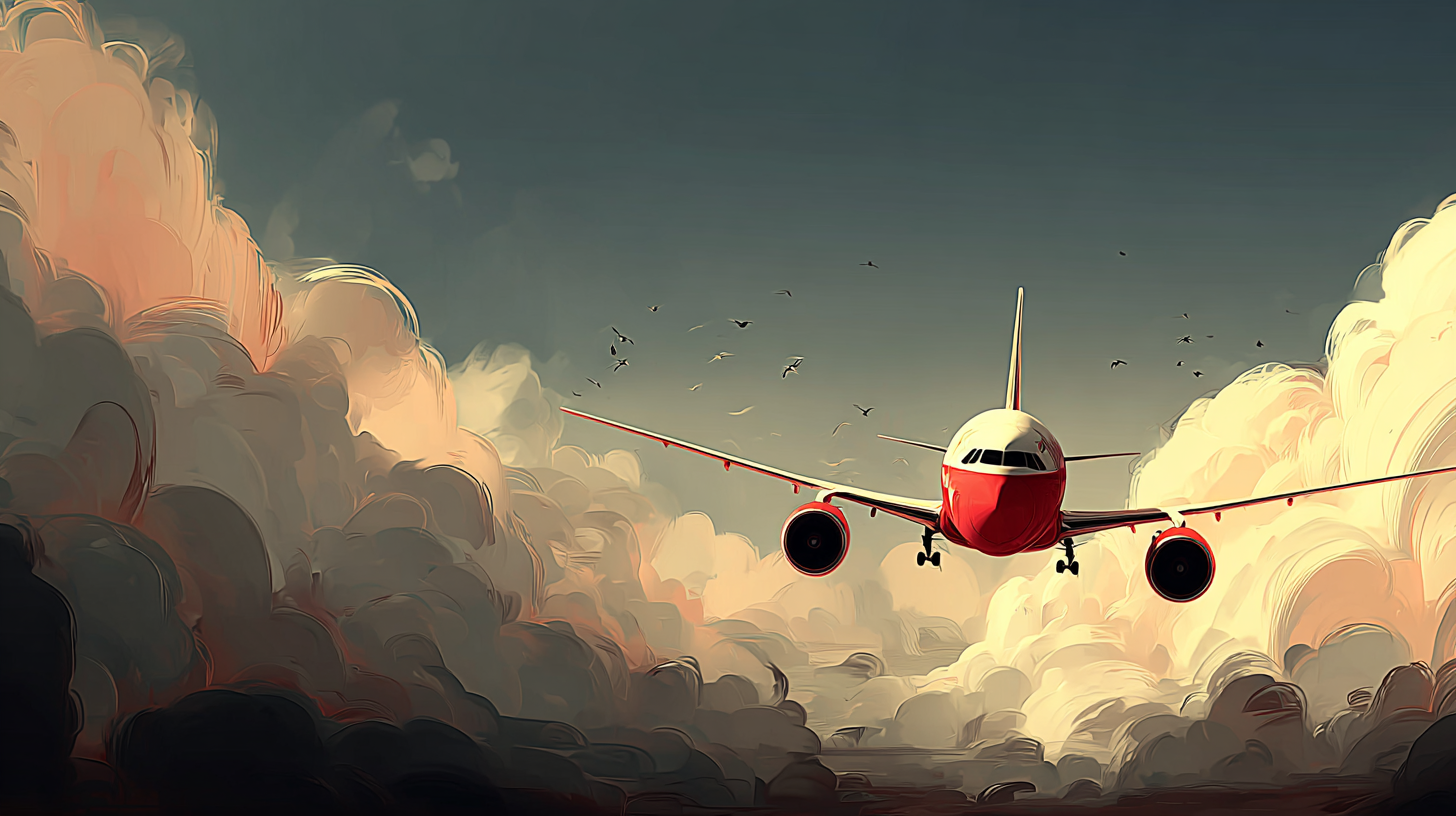Plane mainly means “airplane,” but it can also mean “a flat surface” or “to make wood smooth.”
planeは主に「飛行機」という意味で、ほかに「平らな面」や「木を削る」ことも表す単語です。
以下は英単語 “plane” に関するストーリー型学習コンテンツです。まずは大枠の意味を理解して最後の文章で確認しましょう。
主な意味(main meaning)
| 品詞 | 意味 | 発音記号 | 例文 |
|---|---|---|---|
| noun | 飛行機 | /pleɪn/ | The plane landed safely at the airport. |
| noun | 平面、面 | /pleɪn/ | The carpenter cut the wood on a flat plane. |
| verb | (木材などを)かんなで削る | /pleɪn/ | He planed the surface of the table to make it smooth. |
語源(etymology)
ラテン語 planus 「平らな」が語源。
「平らなもの」から「平面」へ、そして「空を平らに飛ぶもの」として「飛行機」の意味が生まれた。
類義語(synonyms)
| 類義語 | 意味 | 例文 |
|---|---|---|
| airplane | 飛行機 | The airplane took off at noon. |
| aircraft | 航空機 | The aircraft was built in 1990. |
| jet | ジェット機 | The jet flew across the ocean. |
| surface | 表面、面 | The surface of the water was calm. |
反義語(antonyms)
| 反義語 | 意味 | 例文 |
|---|---|---|
| mountain | 山 | The plane flew over the high mountain. |
| rough | でこぼこの、荒い | The wood was too rough before he planed it. |
コロケーション(collocations)
| コロケーション | 例文 |
|---|---|
| board a plane | We boarded the plane quickly. |
| plane ticket | She bought a plane ticket to Canada. |
| plane crash | The news reported a plane crash yesterday. |
| paper plane | The boy made a paper plane in class. |
2項表現(binomials)
| 2項表現 | 例文 |
|---|---|
| safe and sound | The passengers arrived safe and sound after the long flight. |
| trial and error | He built the model plane by trial and error. |
英語ストーリー(english story)
The Business Trip
Mr. Tanaka was a middle manager at a trading company. One morning, his boss told him, “You must go to Singapore for a meeting.” Mr. Tanaka felt excited because it was his first time to travel abroad on business. He immediately booked a plane ticket and started preparing.
At the airport, he saw many passengers waiting to board a plane. Some were students with backpacks, while others were businesspeople like him. He checked the number of his seat and waited for the announcement. Soon, he walked through the gate and entered the airplane. The cabin crew greeted him politely.
During the flight, Mr. Tanaka read some documents. The jet moved smoothly through the clouds. Looking outside, he saw the endless surface of the ocean below. It looked calm and flat, like a huge plane of blue. He remembered the Latin origin of the word “plane,” meaning “flat,” and smiled at the thought.
After several hours, the aircraft landed safely. The passengers were relieved to arrive safe and sound. At the hotel, Mr. Tanaka prepared his presentation. He had built his slides by trial and error, just like building a model paper plane when he was young. The meeting went well, and his clients were satisfied.
However, on the last day, he saw a news report on TV about a plane crash in another country. He felt sorry for the victims and was reminded that flying, while common, could still be dangerous. Still, his own trip had been successful, and he felt proud of his work.
When Mr. Tanaka returned to Japan, he gave his boss a report. His boss said, “Good job. Thanks to you, we can start a new project with the Singapore company.” Mr. Tanaka nodded. His first business trip by plane had taught him many things—not only about work, but also about life.
和訳
出張
田中さんは商社の中間管理職でした。ある朝、上司が言いました。「君は会議のためにシンガポールへ行ってもらう。」田中さんはわくわくしました。初めて海外へ出張に行くからです。彼はすぐに**plane ticket(飛行機のチケット)**を予約し、準備を始めました。
空港では、多くの乗客が**board a plane(飛行機に搭乗する)**のを待っていました。学生もいれば、彼のようなビジネスマンもいました。席の番号を確認し、アナウンスを待ちました。やがて、ゲートを通り、**airplane(飛行機)**に乗り込みました。客室乗務員が丁寧に迎えてくれました。
飛行中、田中さんは書類を読みました。**jet(ジェット機)は雲の中をスムーズに進みました。外を見ると、果てしない海のsurface(表面)が広がっていました。まるで青い大きなplane(平らな面)**のように静かで平らでした。「plane」という単語がラテン語の「平らな」に由来することを思い出し、彼は微笑みました。
数時間後、**aircraft(航空機)は無事に着陸しました。乗客たちはsafe and sound(無事に)到着できて安心しました。ホテルでは、田中さんはプレゼンの準備をしました。彼は若い頃にpaper plane(紙飛行機)**を試行錯誤で作ったように、**trial and error(試行錯誤)**でスライドを仕上げたのです。会議は順調に進み、顧客も満足しました。
しかし最終日、テレビで他国の**plane crash(飛行機事故)**のニュースを見ました。彼は被害者に心を痛め、飛行機は一般的になったとはいえ、まだ危険があることを思い知らされました。それでも、自分の出張は成功し、仕事に誇りを感じました。
日本に戻った田中さんは上司に報告しました。上司は言いました。「よくやった。君のおかげでシンガポールの会社と新しいプロジェクトを始められる。」田中さんはうなずきました。飛行機での初めての出張は、仕事だけでなく人生についても多くを教えてくれたのです。
Q&A
Q: plane と airplane の違いは?
A: 両方とも「飛行機」を意味しますが、airplane は正式で明確な表現、特にアメリカ英語でよく使われます。plane はその短縮形で、日常会話ではこちらが一般的です。
Q: plane と aircraft の違いは?
A: aircraft は「航空機」というもっと広い意味で、飛行機だけでなくヘリコプターや軍用機も含みます。plane は通常、乗客を運ぶ飛行機を指します。
Q: plane と jet の違いは?
A: jet は「ジェットエンジンで動く飛行機」を指します。すべてのジェットは飛行機ですが、すべての飛行機がジェットとは限りません。小型のプロペラ機は plane ですが jet ではありません。
Q: plane と surface の違いは?
A: plane には「平らな面」という意味があり、数学や科学で使われます。surface は「物体の表面」で、凹凸があっても使います。例えば「the surface of the water(水の表面)」は surface を使い、「a flat plane(平面)」は plane を使います。
Q: board a plane の「board」と plane の違いは?
A: board は動詞で「乗り込む」という意味です。board a plane は「飛行機に乗る」で、電車や船にも使えます。plane は「乗り物そのもの」を指します。
Q: plane ticket はなぜ airplane ticket ではないの?
A: 会話では短くするのが自然なので plane ticket と言います。airplane ticket も間違いではありませんが、あまり使われません。
Q: plane crash は car crash と同じように使える?
A: はい、同じように「衝突・事故」を表します。違いは対象の乗り物が飛行機か車かです。
Q: paper plane と paper airplane の違いは?
A: 意味は同じで「紙飛行機」です。イギリス英語では paper plane が一般的で、アメリカ英語では paper airplane がよく使われます。



コメント